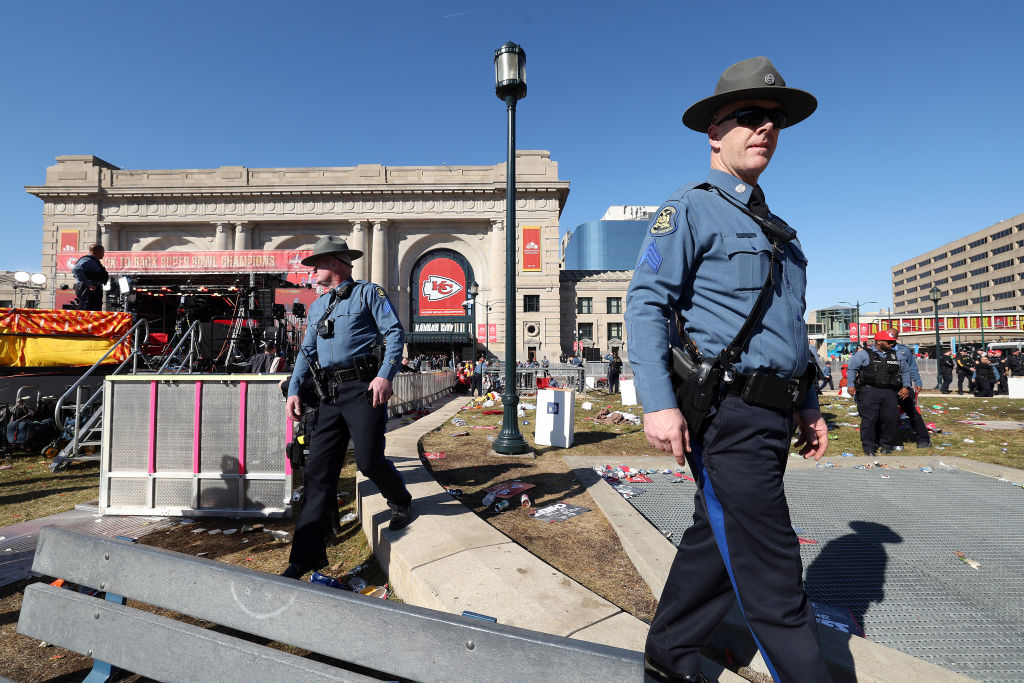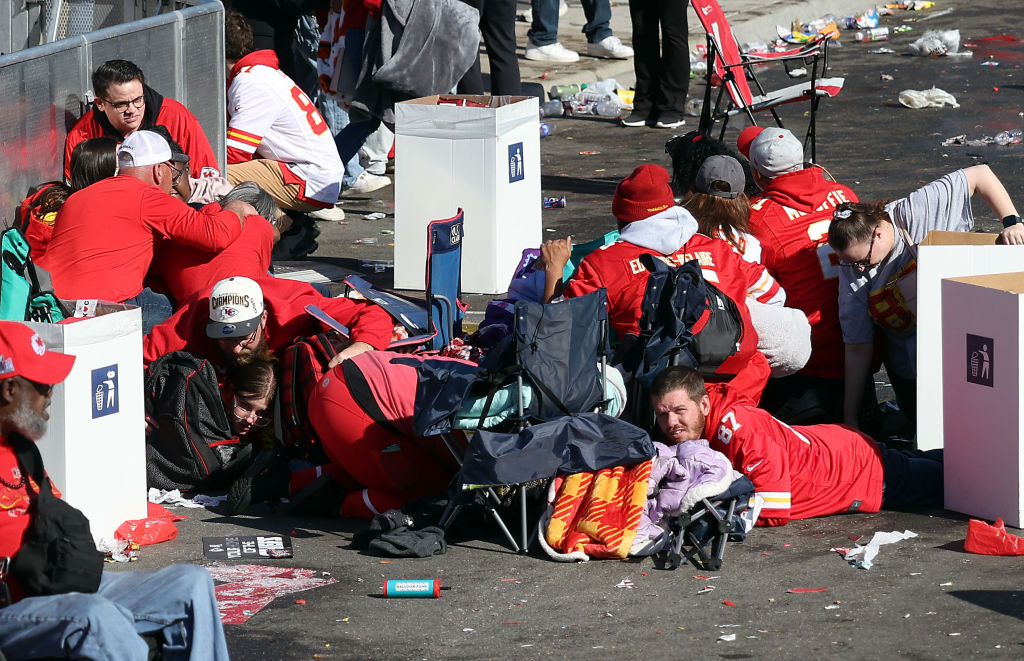
The Kansas City Chiefs’ Super Bowl victory parade ended in tragedy after a mass shooting killed at least one person and injured more than 20 others on Wednesday in Kansas City, Mo. Police detained three people as part of their investigation.
Some NFL players who shared tributes to the victims also called for political action to reduce gun violence, with another mass shooting drawing attention again to local and federal gun laws.
Missouri has one of the highest rates of gun deaths in the country, ranked 9th among states by the Centers for Disease Control and Prevention (CDC) in the most recent available data from 2021. The state was ranked 38th for gun law strength by Everytown for Gun Safety, a gun violence prevention nonprofit organization.
Here’s what to know about gun laws in Kansas City and Missouri, as well as where political representatives stand on the issue.
What are the gun laws in Kansas City and Missouri?
Missouri hasn’t required a permit to open or conceal carry a firearm since 2017, after the legislature overrode the governor’s veto of a law to allow it.
However, intentionally displaying a firearm in an angry or threatening manner not necessary for self-defense is prohibited, and concealed carry is banned in certain locations, including schools, hospitals, correctional institutions, and the state legislature chambers, unless members of that body have a concealed carry permit.
In Kansas City, local law does require a state concealed carry permit for open carry.
Adults can obtain a concealed carry permit if they have received firearm training—unless, within the past five years, they’ve been charged with a serious or violent crime, convicted of two or more misdemeanors involving drunk driving or illegal drugs or determined to be mentally incompetent. Individuals who meet one or more of these criteria can’t possess firearms.
Missouri also doesn’t require firearms to be registered and doesn’t require background checks to purchase a gun from a private seller (federal law mandates checks for federally licensed dealers).

How do local gun laws interact with federal laws?
Missouri has taken action to restrict the influence of stricter federal gun laws.
The state legislature passed a law in 2021 that prohibited anyone in the state from enforcing federal laws that infringed upon the Second Amendment of the Constitution that grants citizens the right to bear arms. The Department of Justice sued the state over the legislation. The case ended up in the Supreme Court, where justices in October upheld a federal judge’s ruling that the Missouri law was unconstitutional.
Where do local politicians stand on gun laws?
Kansas City Mayor Quinton Lucas, a Democrat, has been a proponent for stricter laws to reduce gun violence. Homicides in the city hit a record high in 2023, according to police data.
Lucas met with White House officials in December to discuss a proposal to expand federal background checks, according to the Kansas City Star. Both Missouri Attorney General Andrew Bailey and Kansas Attorney General Kris Kobach reportedly opposed the measure.
Where do federal representatives stand on gun laws?
President Joe Biden, a Democrat, took to X, formerly Twitter, after the parade shooting to call on Congress to ban assault weapons to end the “epidemic of gun violence.” The late Senator Dianne Feinstein, a California Democrat, introduced a ban in early 2023 before her death, with Democrats doing the same in the House. The bills were referred to committee.
Kansas City’s U.S. Representative Emanuel Cleaver II, a Democrat, offered his condolences to the shooting victims’ families, thanks to first responders and prayers for the community in a statement, but continued that “the last thing we need is prayer without purpose or thoughts without action, which have become far too commonplace in the halls of power.” He said Congress needs to act to end “senseless shootings,” but that won’t happen if Congress is “controlled by the gun lobby.”
Cleaver has supported legislation to enhance background checks and ban assault weapons, among other initiatives.
Kansas City, Missouri sits on the border with Kansas. The U.S. senators from both states—Missouri’s Josh Hawley and Eric Schmitt, and Kansas’ Dr. Roger Marshall and Jerry Moran—posted their prayers for victims, thanks to first responders, and calls for justice on social media in response to the shooting.

All four Republicans have said they are defenders of the Second Amendment. Each was endorsed by the National Rifle Association, which donated money to at least three of them, according to information from nonprofit organization OpenSecrets.
Three of the four voted against federal gun reform legislation in 2022 that Biden signed into law in the wake of the Uvalde school shooting, instead proposing other measures. The fourth (Schmitt) was not in Congress yet.
Before a vote against the 2022 legislation, Hawley introduced a bill with Republican colleagues to increase penalties for felons who illegally possess or use firearms, which never received a vote.
Schmitt, who as the state’s former Attorney General advocated for the state legislation to limit the enforcement of federal gun laws, was not in Congress when the 2022 law passed, but said in a post on X before the vote: “Red flag laws are just a green light for gun confiscation. No way.”
Marshall said in a statement after the 2022 vote that red flag laws “violate” the Second Amendment. He said he had already provided solutions through proposing legislation to strengthen the background check system and school safety. Last year, he opposed the Biden Administration’s proposal to expand background checks, saying in a statement it would “strip law-abiding gun owners of their rights.”
Moran said in a statement about the 2022 vote that “We can and must do a better job of preventing violence, however we must work to address the root issues of violent crime rather than create new laws that hinder the Second Amendment rights of legal gun owners.”
In that statement and a policy brief on his website as of Thursday, Moran said the government should enforce existing gun laws and prosecute criminals.
TIME reached out to the senators for comment and to inquire about any new or existing proposals to reduce gun violence.
More Must-Reads from TIME
- Cybersecurity Experts Are Sounding the Alarm on DOGE
- Meet the 2025 Women of the Year
- The Harsh Truth About Disability Inclusion
- Why Do More Young Adults Have Cancer?
- Colman Domingo Leads With Radical Love
- How to Get Better at Doing Things Alone
- Michelle Zauner Stares Down the Darkness
Contact us at letters@time.com